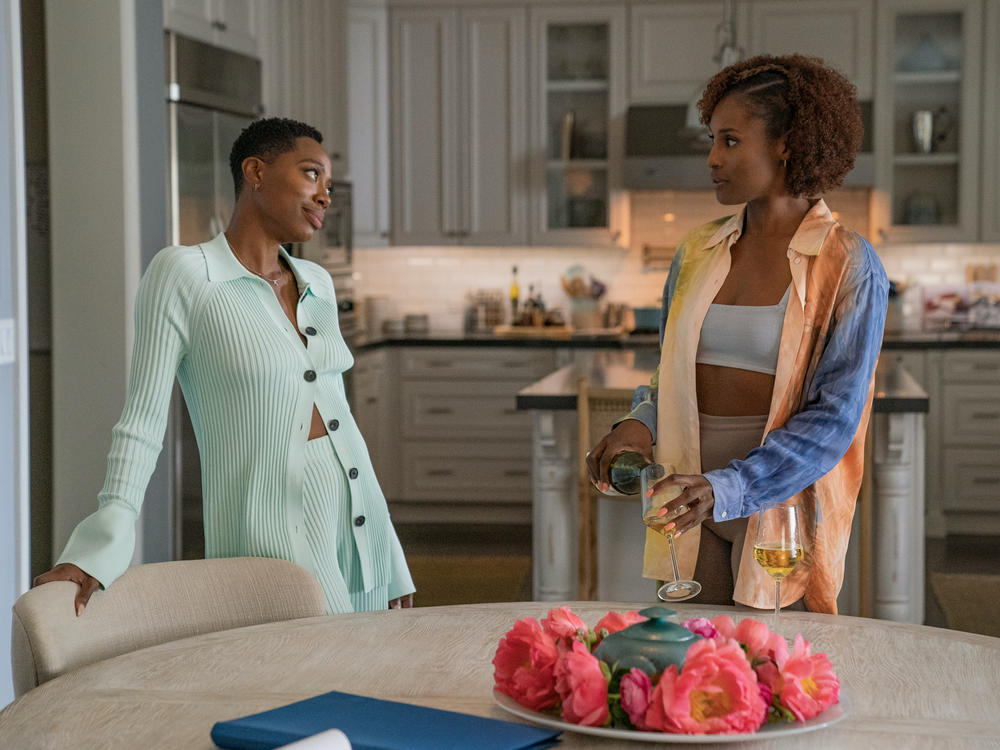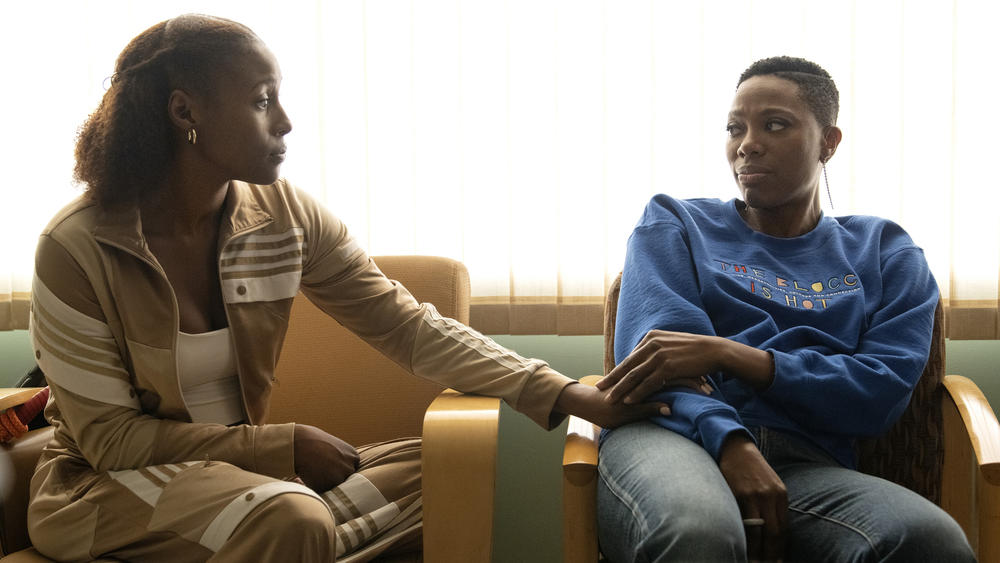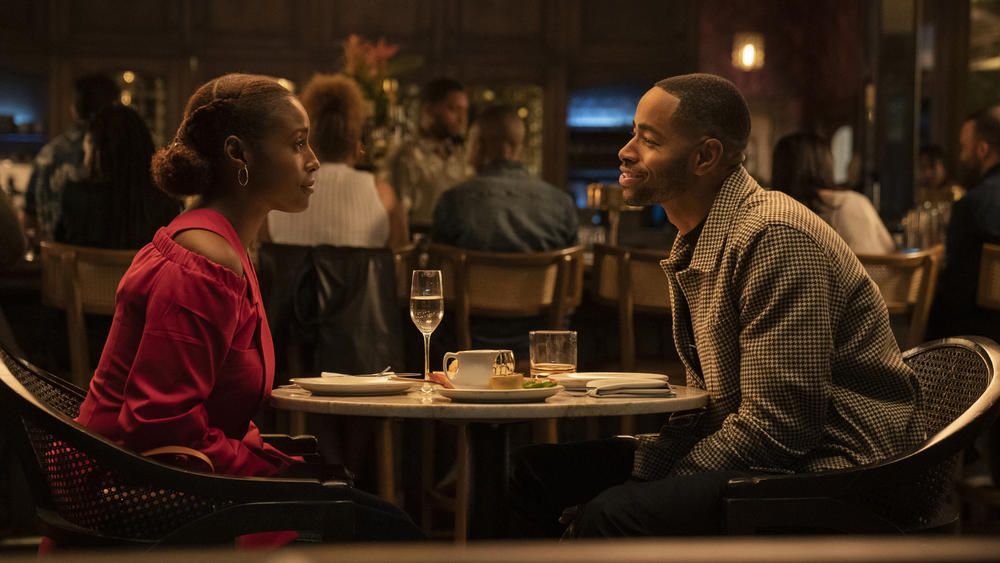Section Branding
Header Content
The romantic drama has never been what makes 'Insecure' so good
Primary Content
Spoilers for the series finale of Insecure ahead.
In the end, Lawrence was Issa's Mr. Big.
Ok, that's a bit simplistic – on Sex and the City, Carrie Bradshaw and Big's on-again-off again relationship is far more dysfunctional and manipulative than the one between Insecure's Issa and Lawrence could ever be. In Season 1, Issa cheats on Lawrence, but he isn't putting in any effort to the relationship, either, and they both suck at communicating, so the damage is applied fairly equally from either side.
But in the series finale of Insecure, the "will-they-or-won't-they" the writers have been teasing all season revealed the answer: They will! And after years of sort of/kind of being together (sometimes) – but primarily interacting through unplanned run-ins and awkward encounters at bougie parties thrown by their mutual friends – the fates aligned to finally put these two messy kids back on the road to being forever boos. It only took the final grand gesture of Lawrence declaring his love in the penultimate episode, cornering Issa at a going away party right after she's thrown away some trash – the symbolism! – and almost coming to blows with the understandably upset Nathan for that to happen. Plus another year or so after that of being apart and dating other people. (This show always did love a good, somewhat vague time-jump).
It was no impromptu trip to Paris, but hey: Like Big did with Carrie, Lawrence realized he needed to fight for Issa once he saw she was getting serious with a guy who wasn't him.
Since its debut, Insecure has been unlike anything else on television
Truthfully, the Lawrence and Issa dynamic was never the most interesting part of Insecure. Early on, their relationship was entertaining and served its purpose as a stepping stone for each to grow a little bit more into themselves. Nevertheless, the show's writers insisted on teasing them as a One True Pair throughout the entire series run – so this ending was all but inevitable in hindsight.
What really made the show so unique and zeitgeisty was a host of other attributes: the look (Ava Berkofsky's masterful lighting was a giant leap for the advancement of brown skin on camera), the deep probing of different kinds of friendships, and the way it so acutely understood certain facets of being a modern Black 30-something in the throes of an identity crisis.
From the beginning of its run in 2016, the appeal of the show was two-fold: It didn't feel quite like anything else on TV, and it was full of good drama. Sure, you could, like me, draw comparisons to predecessors like the aforementioned Sex and the City, or HBO's other hit show about self-absorbed millennials created by and starring an up-and-coming writer, Girls. But those series were also so steeped in whiteness as to be translucent, and the D.N.A. of Black-led shows like Living Single, Girlfriends and Being Mary Jane courses throughout Insecure.
But Insecure was also its own show for the moment, tapping deeply into the intricacies of young lives in limbo to demonstrate how silly, terrifying and fun life can be. Nearly every character seemed to embody a different millennial neurosis, filtered through a specific brand of intellectual-meets-ratchet lens. Issa was indecisive about everything (Lawrence, her job, her friendship with Molly); Molly had rigid standards for everything (but mostly men); the unemployed version of Lawrence was in a depression so deep it rendered him motivationally inert for some time. Miscommunication, or the complete absence of communication, was at the center of many (most?) of the conflicts that arose, and avoidance was usually the name of the game. This was true when we first met Issa and Lawrence, who had long ago already drifted into a routine, unhappy funk with one another; and it was equally true throughout Season 5, as they played phone tag and pined after each other from a distance.
Watching the show's characters grow over five seasons has been both rewarding and exhausting
At its best, watching everyone work through those growing pains has made for engrossing, if sometimes cringeworthy, television. It was both embarrassing and endearing, for instance, to experience Issa's painfully awkward attempts to amass a "hotation" of friends with benefits, including her aloof "neighbor bae." And Issa, Molly, Kelli and Tiffany's banter and bickering while trying to hold on tight to their tight-knit circle has been a welcome addition to the canon of great Black onscreen friendships, right up there with the likes of the Living Single and Girlfriends ladies.
At other times, it felt as though the growth Kelli once observed in Issa in an early episode of the show was evading the characters almost entirely, and for seemingly no other reason than dramatic contrivance. In particular, Molly's reflexive negativity in any given situation (and her repeated resistance to therapy) cast a pall over Issa's own self-improvement attempts. For far too long there were few signs that Molly could ever really change, making her journey less compelling. By Season 5, Molly seemed to finally have seen the light, choosing optimism and self-awareness that was refreshing, if jarring to witness. But getting to that point was, quite frankly, an exhausting experience.
The most mature moment of the series came at the beginning of this final season, when Issa admitted to herself and Lawrence that she wasn't in a place to both be in a relationship with him and deal with his new co-parenting-with-Condola situation. It was as if she was finally choosing herself and doing what felt right, even if it wasn't the easy choice to make. Had the rest of the season kept that momentum going, it would've bucked the rom-com-y trend of most sitcoms and made for a satisfying six-episode coda to Season 4.
In the end, Insecure gave us a happy ending – but did it need to be a romantic one?
But as tends to happen with shows that dance in the realm of melodrama, viewers have latched onto the romantic entanglements from the outset, generating memes and heated debates about the characters' struggling love lives – were you #TeamLawrence, #TeamDaniel, or #TeamNathan? (I personally was on #TeamIssaJustStayInYourHoPhaseABitLonger.) The ongoing suspense and unambiguous conclusion of Issa's quest for the love of her life has surely made a lot of people happy.
I just wish Insecure hadn't fallen so hard on that trope of the final happy ending needing to be a romantic one. In so many other respects, it's broken the mold and reimagined the half-hour dramedy; I love the way the show peppered magical realism through Issa's motivational bathroom mirror moments and the occasional dream sequences. The music curation of the show is a standout, and deeply integral to its emotional resonance. And the breadth of the performances is such that even when the plot stumbles – or a character does or says something that makes you want to reach into the screen, grab them by the shoulders, and shake some sense into them – it still always rings true, and real.
Even with its shortcomings, Insecure has gotten so much right – about arrested development, instability, self-consciousness, shattered expectations, so-called "Black excellence" and vibes. When I look back on it, what resonates most are those sobering moments where dreams clash with reality: Issa's decision to finally take the leap and leave her unfulfilling nonprofit job, one-time hookup buddy Tasha confronting Lawrence with the fact that he's a player who "thinks he's a good dude," Molly learning her parents did not have a picture-perfect marriage, Tiffany's post-partum depression, Nathan's revelation that he's bipolar.
In that final episode, Issa perfectly summed up what's been holding her back all along. "I keep thinking about what it took to get here," she told Lawrence. "Doubting myself, going back and forth about what I wanted, being scared to waste my time and look stupid in case none of it worked out. And then I realized that it was all in my head. You know, no one was doubting me except for me ... But I have to believe that it'll work out, for it to work."
What Insecure did was capture the precarious nature of life in all its moments, big and small, and demonstrate the ways we can and cannot take control of how they act upon us, and how we react to them.
Copyright 2021 NPR. To see more, visit https://www.npr.org.




